How to Do Nothing with Nobody All Alone by Yourself (5 page)
Read How to Do Nothing with Nobody All Alone by Yourself Online
Authors: Robert Paul Smith

BOOK: How to Do Nothing with Nobody All Alone by Yourself
10.66Mb size Format: txt, pdf, ePub
Okay; after the palm, after the back, this comes next: you make a fist, with the fingers up. You lay the knife in the groove between the tips of your fingers and the fat part of your hand. You have the blade laying over the thumb, and the idea is to bring the hand around in a circle, and stick the knife in the ground. You have to do this first with the right hand, then with the left hand. This one is hard to describe, and it sounds hard to do, but strangely enough it's one of the easiest.
HTDN_35
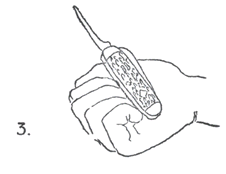
Next, very much like the one above except that you bring your two middle fingers down, your two end fingers sticking out, the knife as in the drawing.
HTDN_36
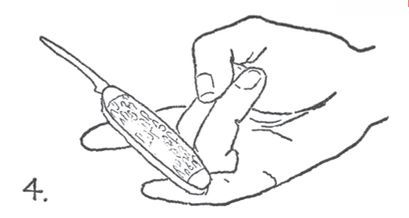
This one you do right and left hand.
Now, remember, each time you get your choice of taking another shot at it if you miss, with the understanding that if you miss again, the other guy gets the knife and when you get it back from him, if and when he misses, you have to go all the way back to the beginning.
Next one is like the two before, except that you just lay the knife flat on your palm. To be sure the knife doesn't slip off, you have to bring your hand around quickly, and that's why this one comes after the two before. You'll have, by then, an idea of how to swing your hand. Incidentally: with these right- and left-hand things, they're all one. If you miss, on the left hand, next time you do it you have to do right
and
left hands.
and
left hands.
Here's another place where the people I've been talking to don't agree. Some of them say sure, they remember this one, others say they don't. I think sometimes we did and sometimes we didn't. You see, in the days when I was a kid, you learned mumbly-peg from another kid, and the rules you learned were his rules. If he came from another part of the country, he taught you the way the kids played there: nobody, so far as I know, ever tried to write down the way to play mumbly-peg until I got stuck with the job. And believe me, the last thing in the world I want to see is an official rule book of mumbly-peg, or mumbly-peg leagues or championships. You can leave this one in, or take it out. It's your game, and you play it the way you think is right. Just be sure that when you play it with another kid, you're both playing the same game.
Now: particularly when you're doing the ones that mean you have to flip the knife over sideways, make sure the other guy is sitting across from you, not next to you, so he isn't in the way if the knife slips: and if you're the other guy, make sure you're not sitting in the way. When we were kids, we used to play it squatting, not sitting, but that's because when we were kids, if we came in with our pants dirty, we caught blue blazes. With the dungarees you kids wear, I don't know how anybody could tell if they were dirty.
The next one is pretty easy, sort of a breather after the hard ones. It's done standing up. It's called the high dive. For this, you put the point of the knife against the fat part of your hand, the little pillow of your thumb. You balance the han-dle back against your finger, and then tip the knife over so that it flips over and into the ground.
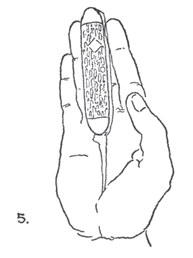
HTDN_38
The next one is a real cinch. I really don't know why it comes into the game this late, because you have to try pretty hard to miss this one, but this is where it comes all the same. It's called through the well. All you do is make a circle with the thumb and index finger of your left hand, and just drop the knife through. Okay now, the next one is called pennies. You take the knife by the handle, rest the point of the blade on your first finger, put the first finger of the other hand on top of the knife, and flip. Same thing with point of blade on second finger, third, pinkie. Right hand first, then left hand.
HTDN_39
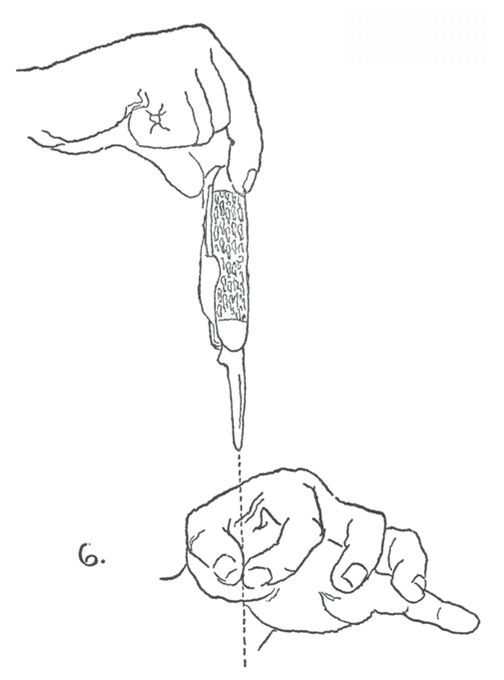
HTDN_40
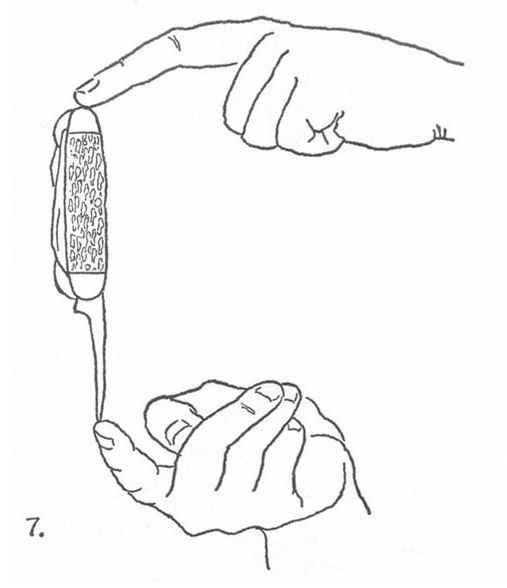
The next one is called nickels. You take the knife by the blade between your thumb and first finger, and stand up. You flip it. Then between your thumb and second finger, then thumb and third finger, then thumb and pinkie. First right hand, then left hand.
Pennies and nickels are kind of tough, and very annoying, and it's here that you'll be tempted to take your second chance and miss, and find yourself all the way back at the beginning, but it's also where you'll find you do it better if you keep on going, there's a kind of rhythm to it; and it's quite a choice which to do.
HTDN_41
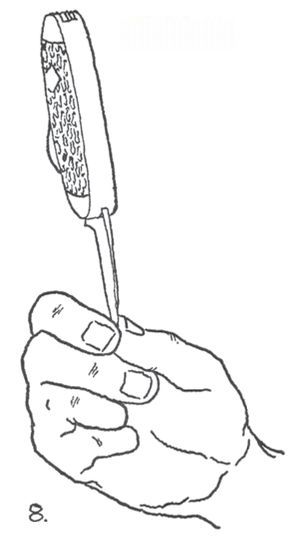
All through the game, by the way, if you hit a pebble, it's a free shot, and I imagine there will be arguments about whether it hit a pebble or not. The only advice I can give you is don't holler it was a pebble if it wasn't, and if it was keep on hollering until you win. The other thing there will be
arguments about is this: Sometimes the knife won't stick straight up. If it leans over, this is the rule: if you can get two fingers under it, it counts.
arguments about is this: Sometimes the knife won't stick straight up. If it leans over, this is the rule: if you can get two fingers under it, it counts.
HTDN_42
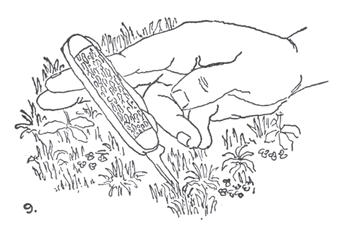
The reason why there'll still be arguments even with the rule is that sometimes it looks as if the guy is ootzing the knife up with his two fingers. It mostly looks that way when it's the other guy, rarely when it's yourself. Anyhow, this argument, like all arguments with your equals, is something you'll learn to straighten out by yourselves.
Now that the argument about the argument is over, we go to Tony Chestnut. If you break that name into pieces, it becomes
toe
,
knee
,
chest
,
nut
.
toe
,
knee
,
chest
,
nut
.
Sitting down, you put your heel on the ground, the knife on your
toe
, like this.
toe
, like this.
HTDN_43a
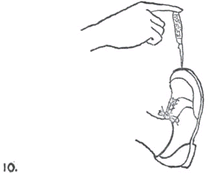
Kneeling on one knee, the other like this, the knife like this, is
knee
.
knee
.
HTDN_43b
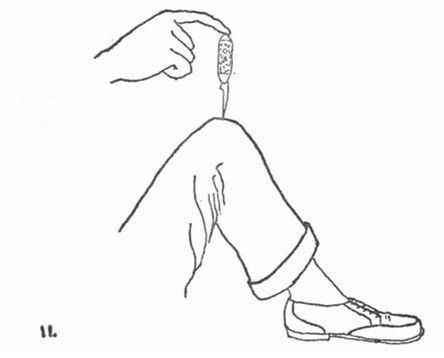
Other books
A Christmas Affair by Byrd, Adrianne
The Family Tree by Sheri S. Tepper
The Book of the King by Chris Fabry, Chris Fabry
A Shred of Evidence by Jill McGown
A Werewolf's Moon (The Council) by Isabella, J.C.
Tampico (James A. Michener Fiction Series) by Olson, Toby
Death on a Short Leash by Gwendolyn Southin
The Readaholics and the Poirot Puzzle by Laura DiSilverio
Bitter Inheritance by Ann Cliff
Plush Book 2: A Billionaire Romance by Winters, KB